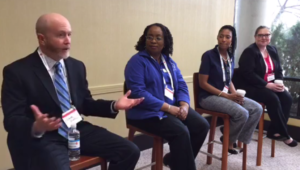INSIDE THE 
NEWS + ADVICE
Recruiters’ Advice to Enhance Your Cleared Job Search Success
If you have a chance at a Cleared Job Fair or industry event to hear recruiters talk about how to succeed and what you should know about job search – TAKE IT!
Sure, there are differences among recruiters in what the advice is. That is tied to their company’s practices, their breadth of experience, and often to the size of their operation. But you will learn a lot of useful information. Here are some examples from recent recruiter panels and career conferences.
Question: Should I use an objective statement, a summary, both or neither?
Answer: Always use a summary statement rather than an objective statement. Make sure you tailor it to the specific position when you are applying for a job. Make it more general for job fairs but keep it short and focused on achievements and use industry keywords.
Question: How valuable are certifications, especially in IT?
Answer: Certifications that are mentioned in the job posting or are common requirements are very valuable. Do not list every certification you have, keep to those most critical for the job you seek. Understand that if you are changing careers and/or are transitioning from the military that you still may need to take a lower level position even with certifications.
Question: I am retiring, should I put that in my LinkedIn headline and resume summary?
Answer: Skip the word ‘retired’! While most of us recognize that military and some federal employees retire at younger ages than the private sector. Don’t lead with that information. It may make a hiring manager wonder if you really want a management or more senior technical position now. Some may also wonder if you are a bit set in your ways. You might consider using the ‘transitioning’ or ‘transitioning military’ term in your LinkedIn headline or Summary if you have the space.
Question: Why do recruiters search for people when I keep reading that there are 300-400 applicants for every position?
Answer: The number of applicants for a job ranges with the level and expertise required by the position. Many technical positions and those requiring advanced clearances get only a few applicants. Many applicants for every position do not meet the minimum requirements as a lot of people ‘spray and pray’ by answering every job ad they see. Recruiters are usually more skilled at using Boolean search than job seekers are – so they are more likely to find qualified job seekers than those job seekers are to find them. Also, hiring managers are often in a hurry and do not want to wait for job postings and responses to see the first resumes.
Question: I have applied for a job with a company I really want to work for and now there are other jobs there that interest me, should I keep applying?
Answer: If you are applying for a select few related positions, go ahead and apply again. If you have already talked with a recruiter there, talk to that person about your interest in the other job. But don’t apply for a wide range of jobs – that tells the recruiter that you do not know what you want to do and is usually disqualifying.
Question: And the variant of that question – I interviewed for a job which I am not interested in it now but have seen other jobs there I am interested in, do I apply again or call or what?
Answer: If you have interviewed at a company and not told them already that you are not interested in that job, be careful about other applications. You might contact the recruiter and say you saw another job that interests you and what that is. Explain why, be positive, and ask about it. But, at most, this is for one other job and not several.
Question: I am transitioning from the military and showing my rank with my positions will show great progression. TAP recommends against this, do you?
Answer: Most often hiring managers and recruiters outside of veteran hiring programs will not recognize what your rank actually is or what it means. Even veterans from other services do not always know rank outside their service. Use your achievements to show your progression. Consider adding one line at the beginning of your more recent positions to show their scope if it is directly related to the job you seek.
Question: I have been told several different things about where to show education. Does it make a difference?
Answer: This is often a company size related response or a specific corporate preference which is why you get different answers. If your education is quite recent or meets a mandatory requirement, common in government contracts, then putting it right under your summary may be smart. If you are networking within the company or have been connecting with a company recruiter, ask what they prefer. Otherwise, if you are selling your experience or your degrees are unrelated to the work, put them at the end.
Question: I have been told that my resume should be one page long and that is should be as long as needed. What is the right answer?
Answer: Generally, a one page resume is great in your first 6-9 years of work while a two page resume is the norm for anything more than that. You only need to cover the most recent 10-12 years of experience on your resume – and it should be tailored to the position requirements if you are submitting it for a specific job. Now some government contractors will want to see a longer resume if that is what it takes for you to demonstrate you have all of the requirements the job calls for. For a job fair, be sure you have the most important achievements focused on the job types you seek and keep it to 1-2 pages as above.
 Patra Frame is ClearedJobs.Net’s HR Consultant. She is an experienced human resources executive and founder of Strategies for Human Resources. Patra is an Air Force veteran and charter member of the Women in Military Service for America Memorial. Follow Patra on Twitter @2Patra.
Patra Frame is ClearedJobs.Net’s HR Consultant. She is an experienced human resources executive and founder of Strategies for Human Resources. Patra is an Air Force veteran and charter member of the Women in Military Service for America Memorial. Follow Patra on Twitter @2Patra.


This was a very helpful summary and answered many questions I have had myself about hiring, protocols with good ideas that will help me avoid mistakes.
Thank you!